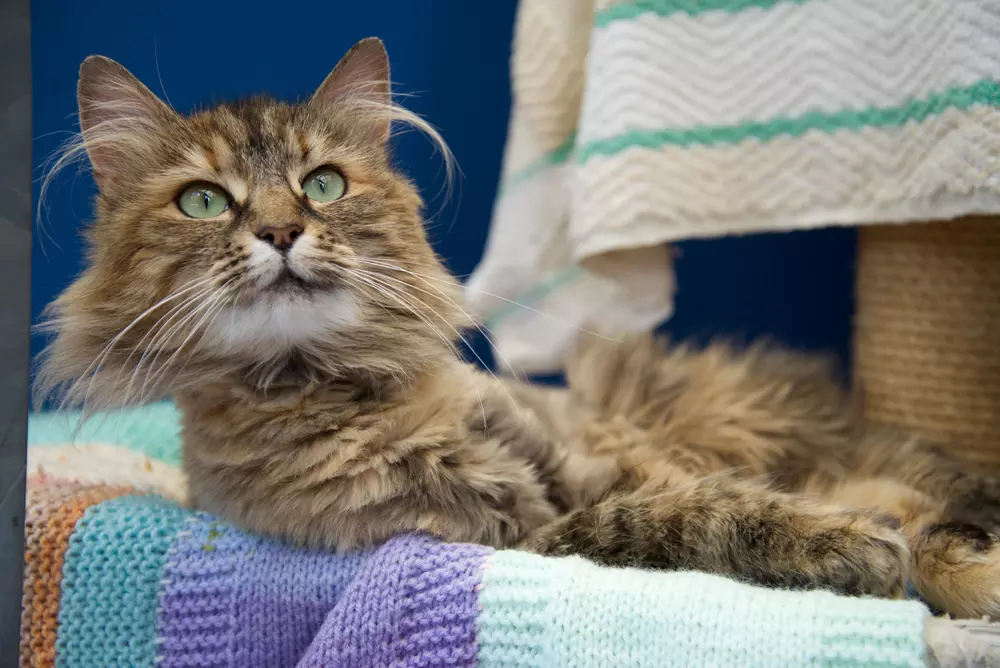
Caring for a cat with asthma
- Feline asthma is an immunity-related condition and can be triggered by an allergy or stress
- It causes chronic inflammation of the small passageways in the lungs
- Symptoms include wheezing, difficulty breathing and a persistent cough
- It is incurable but the condition is manageable with the right care and medication
What is feline asthma?
Like in humans, asthma in cats is a chronic inflammation of the small passageways in the lungs. Although incurable, it’s generally manageable with the right care and medication, and cats with the condition normally lead happy and active lives.
What causes asthma in cats?
Asthma in cats is an immunity-related condition and attacks can often be brought on by an allergy or stress. Suspected triggers include pollen, grass, mould, dust mites, tobacco smoke, cat litter, household cleaning products and even some foods.
The condition usually develops between the ages of two and eight years old, with a slightly higher prevalence in female cats. Certain breeds also have a genetic disposition to the condition, such as Siamese and Himalayan cats.
What are the symptoms of feline asthma?
- Wheezing
- Rapid or difficulty breathing, or increased effort to breathe
- Persistent cough or gagging, like that triggered by a hairball
- Frothy mucus while coughing
- Difficulty breathing after exertion
- Keeping mouth open while breathing
- Neck extended upwards and gasping for breath
- Squatting with shoulders hunched, neck extended and low to the ground
- Overall weakness and lethargy
- Audible throat gurgling
- Increased swallowing
- Blue lips and gums
If your cat shows any of the symptoms above, even if they are intermittent, you should speak to your vet straight away. Any cough or wheezing is a serious health issue, as it happens because the lungs are inflamed and are therefore at risk of developing permanent scars on them.
When resting or sleeping a cat will normally take in 24 to 30 breaths per minute – anything over 40 may need medical attention (remember, cats may breathe faster when excited or purring). Snoring or loud breathing when resting is not necessarily a sign of asthma.
Diagnosing feline asthma
There is no single test to accurately diagnose asthma. Other conditions which mimic the symptoms will initially need to be ruled out, including heart disease, heartworm, lungworm and respiratory infections.
Your vet will first listen to your cat’s chest with a stethoscope and may sometimes take a blood test to look for a high concentration of white blood cells, which can be associated the condition as it signals an allergic response.
If the blood test suggests your cat could be suffering from asthma, a chest X-ray can then be used to look at the lungs – although it isn’t always possible to obtain an X-ray if your pet is having a bad attack as any attempt at restraint or sedation can be very dangerous for them. Be guided by your vet as to whether treatment should be given or if diagnostic tests should be attempted. Over-inflation caused by the pet’s inability to completely exhale, a partial collapse of the lung or flat diaphragm are all signs your vet will be looking out for. However, not all cats with asthma with show abnormalities in an X-ray and it may look completely normal, especially if they are in the early stages of the disease.
There is also a test called Bronchoalveolar Lavage (BAL), which involves taking a mucus sample under anaesthetic from the small airways and studying it under a microscope to look for a specific type of white blood cells called eosinophils, which are linked with the condition.
A cat may also be prescribed a course of corticosteroids and bronchodilators to see if symptoms clear up, which will also indicate the presence of feline asthma.
What are the signs of a feline asthma attack?
During a minor attack your cat will normally start coughing and struggle to stop. They are likely to hold their neck out straight and keep their head close to the ground while coughing, with a wheezing sound audible.
When your cat is having a full blown asthma attack breathing becomes difficult and your pet’s sides will very visibly heave in and out. They will be unable to do anything else, and in extreme cases can start panting, look frightened and start coughing up mucus as well as drooling. If this happens it’s very important to call the vet immediately.
What should I do if my cat has an asthma attack?
In the event of an attack, stay calm, give any medication prescribed by your vet and ensure they are in a quiet, cool area with good ventilation.
If your cat is in distress and is in the grip of a severe attack, then contact your vet straight away. If you need to take them to the veterinary surgery, ensure your car is well ventilated with a window open to let in plenty of fresh air. Avoid them getting any more stressed as this can worsen an attack – and your cat will already be very frightened.
Treatment for feline asthma
There are two main types of treatment to manage asthma in cats – anti-inflammatory drugs such as corticosteroids to reduce the inflammation which leads to the symptoms, and bronchodilator medication which helps to widen a feline’s air passage when needed. Antihistamine drugs may also be used when cats haven’t responded to other treatments.
Medication is often administered through an inhaler, but can also be given in tablet or injection form. If an inhaler is recommended then ensure you are clear on how to use it, with guidance from your vet. Inhalers used by people work differently from those prescribed for cats because you can’t ask your pet to breathe deeply to trigger release of the drug.
Can asthma in cats be prevented?
Although there is no cure, there are steps you can take to reduce the likelihood of your cat suffering an asthma attack. Allergy testing can be done to enable you to establish the root cause of the condition, and eliminate the relevant triggers wherever possible.
Avoid smoking around your pet or using perfumes, air fresheners or any aerosol products as they can worsen the condition, as can cat litters that create lots of dust or are scented. As stress can aggravate the disease, you should ensure your cat remains as relaxed as possible at all times.
Obesity can also increase the severity of the condition so it’s important to keep your cat in shape and provide a good diet.
It’s also a good idea to keep a diary of any asthma attacks your cat suffers, recording the time and date, severity and treatment given to build up a picture of any seasonal patterns or environmental factors that can trigger symptoms in your pet. Taking a video to show your vet can be very helpful.

Donate today
We can’t provide pet advice without your support. Your donations allow our experts to create advice that is accurate and up to date. If you found this page useful, please help us to create more pet advice by donating.

Donate today
We can’t provide pet advice without your support. Your donations allow our experts to create advice that is accurate and up to date. If you found this page useful, please help us to create more pet advice by donating.








